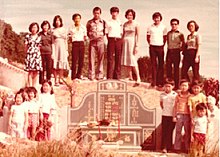Tan Pin Pin's filmography:
Films[edit]
To Singapore, With Love (2014)[edit]
In 2013, Tan released
To Singapore, With Love, which revolves around political exiles, some of whom have not been home for as long as 50 years. The documentary won Tan the best director award in the Muhr AsiaAfrica Documentary section at 10th
Dubai International Film Festival (DIFF). It was made with the support of the Asian Cinema Fund and the
Busan International Film Festival, where it had its world premiere in competition.[SUP]
[3][/SUP] The film was banned in Singapore, with the
Media Development Authority claiming that it undermined national security.[SUP]
[4][/SUP]
Snow City (2011)[edit]
In 2011, Tan released
Snow City. Snow City had its international premiere at the
Singapore Biennale[SUP]
[5][/SUP] and was invited to screen in competition at
Cinéma du Réel.[SUP]
[6][/SUP][SUP]
[7][/SUP]
The Impossibility of Knowing (2010)[edit]

Still from The Impossibility of Knowing
documents Tan's attempt to capture the aura of spaces in Singapore that have experienced trauma. Tan was among four Asian directors who were commissioned by the
DMZ Korean International Documentary Film Festival[SUP]
[8][/SUP] to make a short film on the theme of "peace, life, and communication".
The Impossibility of Knowing premiered on 11 September 2010.
The film also screened at
Visions du Réel[SUP]
[9][/SUP] and the
Oberhausen International Short Film Festival[SUP]
[10][/SUP]
Invisible City (2007)[edit]

Ivan Polunin in Invisible City
The 2007 documentary
Invisible City, chronicles the ways people attempt to leave a mark before they and their histories disappear. Tan interviews people – photographers, journalists and archaeologists – who are propelled by curiosity to find a City for themselves.
The film enjoyed a five-week sold out run at
The Arts House in Singapore and screened at
Berlinale, Pusan.[SUP]
[11][/SUP]
Invisible City also won the Prix de la Scam at
Cinéma du Réel, and the Asian Vision Award, Merit Award, at the Taiwan International Documentary Festival.
Singapore GaGa (2005)[edit]
Singapore GaGa, a survey of Singaporean life as expressed in sounds, is Tan's best-known film yet. The film is Singapore's first documentary to have a cinema release and it enjoyed a seven-week sold out run at
The Arts House. Apart from being acquired for screening on board
Singapore Airlines, it has also played in film festivals around the world.[SUP]
[12][/SUP][SUP]
[13][/SUP]
Singapore GaGa was voted Best Film in 2006 by
The Straits Times.
Crossings: John Woo (2004)[edit]
In 2004, Tan released
Crossings: John Woo, a film showing the history and life of one of Hollywood’s most celebrated directors
John Woo. The film showcased rarely seen clips from Woo's earlier works.
Crossings: John Woo premiered on Discovery.
80km/h (2003)[edit]
80km/h is a single continuous take of the 38-minute long drive across the island of Singapore on the
Pan Island Expressway, and the view along the way.
Gravedigger's Luck (part of Afterlife Series) (2003)[edit]
Tan released
Gravedigger's Luck, part of Discovery Network's Afterlife series. It documents a man who tries multiple luck-enhancing methods to counter the curse of bad luck he believes he has because of his job as a grave exhumer.
Gravedigger's Luck was the runner up for Best Documentary at the
Asian TV Awards, and the runner up for Best Infotainment Programme. She was the series consultant for the Afterlife series.
Building Dreams (2002)[edit]
The 8-part series on the history of Singapore architecture
Building Dreams featured two episodes Tan directed –
Dawn of a New Era and
Spaces of Memory. The pieces showed a rare look inside the dome of the
Old Supreme Court Building, Singapore, as well as a house designed by renowned Singaporean architect Ho Kwong Yew.
Building Dreams was produced for
Arts Central by Xtreme Productions.
Moving House (2001)[edit]

Still from Moving House
gives an insight into what it is like for one of the 55,000 families in Singapore forced to relocate the remains of their relatives from a cemetery to a columbarium. The film was one of six documentary ideas commissioned by Discovery Networks Asia and is the first documentary it funded that was entirely conceptualised, initiated and directed by a Singaporean.
Moving House won the
Student Academy Award for Best Documentary,[SUP]
[14][/SUP] Best Documentary at the USA-Asean Film Festival,[SUP]
[15][/SUP] an award for Discovery Channel's Asia First Time Filmmaker Award, a Certificate of Merit at the
Chicago International Film Festival, and the Documentary Prize at Nextframe.
Rogers Park (2001)[edit]
The 2001 short
Rogers Park gives audiences a snapshot of the lives of three people – a man, a woman, and a boy. They live under one roof and yet in emotionally separate spaces in Chicago's Rogers Park.
Rogers Park was a Student Academy Awards Regional Finalist, won the Golden Reel Award and the Chicago Filmmaker Award. It also screened at the Clermont Film Festival in France.[SUP]
[16][/SUP]
microwave (2000)[edit]
Tan's
microwave takes a humorous jab at the world's obsession with everybody's favourite plastic doll. The film was done in a single shot and has screened in multiple festivals around the world.[SUP]
[17][/SUP][SUP]
[18][/SUP][SUP]
[19][/SUP]
Moving House (1997)[edit]
Moving House (1997) was about the exhumation of Tan's great-grandparents' grave in 1995. The site was off Sixth Avenue in Singapore. This was the first of three documentaries about grave exhumations.









